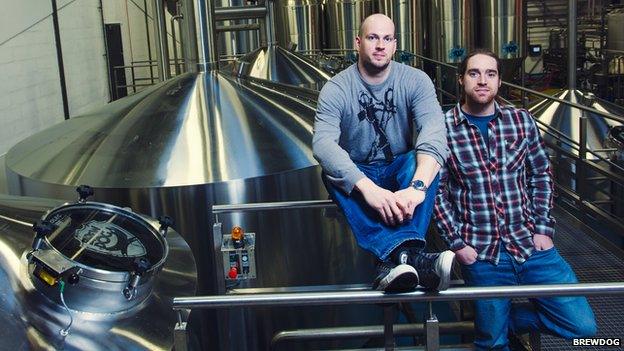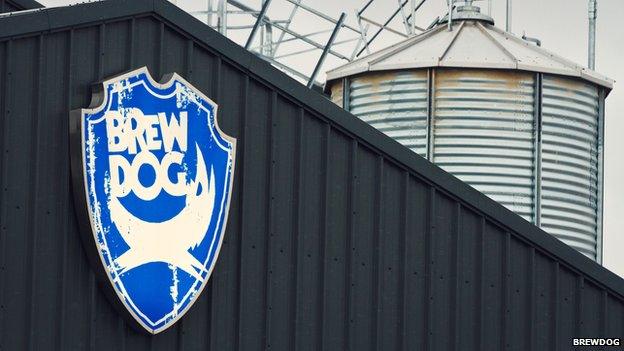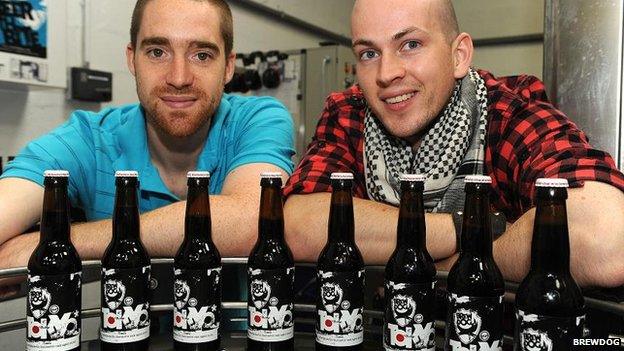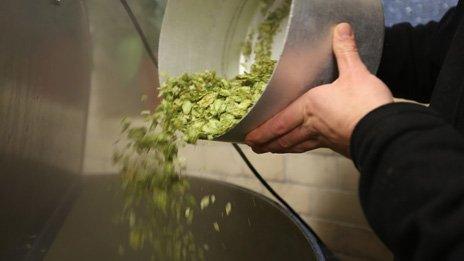How controversial beer firm BrewDog became so popular
- Published

Friends James Watt (left) and Martin Dickie set up the business in 2007
When the founders of popular but controversial beer company BrewDog needed a second bank loan to enable them to expand production, their tactic was a simple one - lie through their teeth.
It was back in 2008, and James Watt and Martin Dickie's then tiny brewery at Fraserburgh, north-east Scotland, was little over a year old and struggling.
Selling their US-style craft beers from the back of their van at farmers' markets, they were missing payments on their £20,000 ($30,000) bank loan.
"We were selling a couple of cases on a good day, and losing money," says Mr Watt, now 32.
And then they decided to enter a bottled beer competition organised by supermarket group Tesco. BrewDog won first, second, third, and fourth place.
"So we went down to Tesco's headquarters [just north of London], and they told us they loved our beer and wanted to put us in 500 shops, buying 2,000 cases a week," says Mr Watt.
"We put on our best poker faces and said 'no problem'. Yet we were just two guys filling bottles by hand."
With Tesco wanting first deliveries in four months' time, Mr Watt and Mr Dickie, also now 32, went to their bank to ask for another £150,000, so they could quickly install a bottling line, and expand production.
But failing to meet the payments on their existing loan, the bank said a firm "no".
So the business partners went to another lender, and lied.
Mr Watt says: "We said that our bank had offered us an amazing deal, but that if you can match it we'll switch, and they went for it. You have got to do what you have to do."

BrewDog's colourful labels stand out on a shelf
With BrewDog now being able to increase its brewing facilities, it was able to start supplying Tesco on time with bottles of its Punk IPA.
The beer was an immediate hit, and the other UK supermarkets soon followed suit.
Fast forward to 2014, and BrewDog is due to see its turnover top £32m this year.
It employs 357 people, and as well as continuing to supply the likes of Tesco UK-wide, it owns 25 bars, 18 across the UK, and seven abroad.
And now based at a larger brewery down the road in the town of Ellon, it exports to 52 countries.
Successful crowdfunding
Childhood friends who grew up in the Scottish town of Peterhead, Mr Watt and Mr Dickie started brewing beer together as a hobby in their early 20s.
At the time Mr Watt was working as a deep sea fisherman, while Mr Dickie was a whisky distiller.

Three rounds of crowdfunding has helped the company raise funds to expand
From the very start they were inspired to brew American-style craft beers - sweet-tasting ales with high alcohol levels and very large amounts of US hops, which gave them a bold, fruity, even perfumed flavour.
They are very Marmite beers in that you either love them or hate them. To fans they are flavoursome and interesting, to critics they are undrinkable.
Yet, confident they could convert drinkers, and after some good reviews, Mr Watt and Mr Dickie decided to quit their day jobs and start brewing professionally in 2007.
"Even though the first year was tough, we never lost faith in what we were doing," says Mr Watt. "We were hell-bent... we were stupidly ambitious."
In addition to the bold flavours, the two men also worked hard on creating an irreverent brand image for BrewDog, giving their beers fun names, and bright, colourful labels. Some of their other brews are called Dead Pony Pale Ale, Dogma and Hardcore IPA.
Expansion has been made possible after the business raised £7m via crowdfunding, with 15,000 people paying £95 for a stake in the company. In return they get discounts in BrewDog's bars, and other perks.
'Killjoy jobsworths'
In more controversial matters, Mr Watt and Mr Dickie have also regularly - and enthusiastically - attacked regulators and industry bodies. Their critics say they do so simply to garner publicity, but Mr Watt says they are merely sticking up for themselves.
Earlier this year the Portman Group, the UK drinks industry trade body that promotes responsible drinking, criticised BrewDog, saying that the label of the brewery's Dead Pony Pale Ale promoted anti-social behaviour and binge drinking.

BrewDog's response at the time was as follows: "Unfortunately, the Portman Group is a gloomy gaggle of killjoy jobsworths, funded by navel-gazing international drinks giants."
When contacted by the BBC for this article, a spokesman for the Portman Group said: "BrewDog's business model has traditionally used complaints by the public as a PR opportunity for their brands.
"BrewDog and the Portman Group have a long history... we don't expect them to like us, but we were pleased to see they have started relabeling their products."

Beer trivia

There are no hard and fast rules on what makes a "craft beer". However, typically it is a natural beer made by a small brewery, often with large amounts of pungent hops and a marked sweetness from the barley malt
So what is the difference between "craft beer" and "real ale"? Unlike craft beer, real ale - as determined by UK pressure group Campaign For Real Ale - has to be unpasteurised and unfiltered. Real ale also more often has a drier flavour.
Craft beer is also typically served well chilled and carbonated, whereas real ales are served less cold and have no added gas
Yet, like lager (which itself can be a craft beer or real ale), they share the same basic four ingredients - malted barley, hops, yeast and water. In all cases other ingredients can be added on top, such as different grains

A similar dispute that BrewDog had in 2013 with the UK's advertising watchdog, the ASA, saw Mr Watt call the officials "killjoy, self-important pen pushers".
BrewDog has also been criticised for selling some beers with exceptionally high alcohol rates, such as a limited edition ale that was 55% alcohol.
Mr Watt says that he and Mr Dickie - who together own a 75% share of the business - remain unrepentant, and simply "make beers that we want to drink ourselves".
Mr Watt adds that BrewDog's products are bought by beer aficionados, and priced at a premium. He says that if someone is going to abuse alcohol they will be the cheaper, mass market beers that give drinkers "maximum bang for their buck".
With exports now making up 65% of sales, Mr Watt says they have no plans to slow down the fast-paced growth.
"My worry is that we aren't growing fast enough," he says.